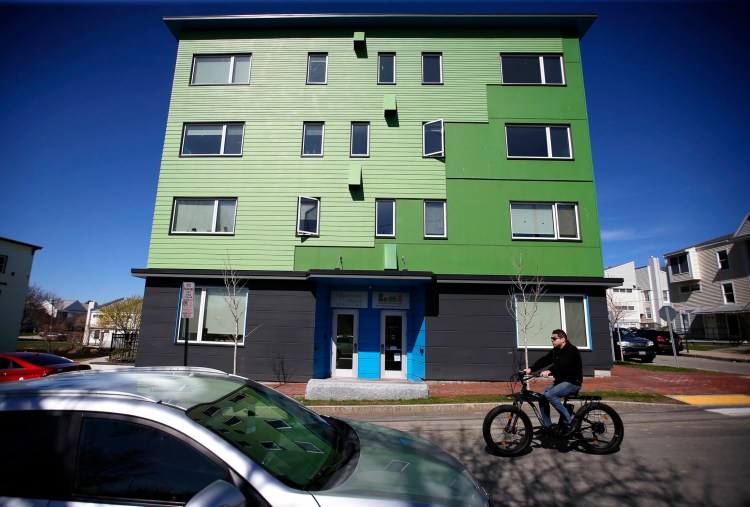Affordable housing advocates are backing a measure in the State House to give up to $80 million in tax incentives to double the number of low-income housing units built in Maine over the next four years.
The bill would give developers access to refundable tax credits to finance the construction of low-income housing. The bill, proposed by Rep. Ryan Fecteau, D-Biddeford, caps the credits at $20 million per year.
Credits give housing developers or investors a refund on their state income taxes. Fecteau’s proposal is designed to mirror a federal credit a program responsible for nearly all new low-income housing construction in the U.S.
“Our state is facing an affordable housing crisis,” Fecteau said during a public hearing on his bill before the Legislature’s taxation committee Monday.
More than 35,000 renter households in Maine pay more than half their income for rent and utilities, Fecteau said. Those “severely rent-burdened” households represent almost 25 percent of all rented homes in the state, according to 2017 survey data from the U.S. Census Bureau.
Nearly 33,000 families or individuals are on waiting lists for just 13,824 affordable housing units, the Maine Real Estate Managers Association said. The average wait time for an apartment is about five years and market rates in every county are too expensive for individuals and families earning the state’s $11-an-hour minimum wage or the mean renter wage, the Maine Affordable Housing Coalition said.
As safe, clean and affordable housing drifts out of reach for many Mainers, the construction of low-income housing has not kept pace, Fecteau said. Developers produce about 250 new units of low-income housing a year in Maine. New tax credits could double annual construction, creating an additional 1,000 new housing units over four years, he said.
“This is unsustainable, we have to do better, which is why the bill before you is so important,” Fecteau said.
Developers and housing advocates testified in favor of the bill, L.D. 1645, on Monday. There was no testimony in opposition to the measure.
Developers in Maine use a high-value federal tax credit that covers almost the entire cost of new low-income housing. But those credits are doled out to states based on population and are used up quickly.
There is an unlimited supply of less valuable federal tax credits, but they only pay for about 30 percent of a housing project, said Greg Payne, director of the Maine Affordable Housing Coalition and a development officer at Avesta Housing, one of the state’s largest affordable housing development and management companies.
That means developers have to come up with more than half of a project cost and most of that money has to be subsidized, Payne said. If they rely on private loans, a developer will have to make rents too expensive for low-income families in order to pay off the debt.
A state-level tax credit would give developers another financing tool, Payne said.
“The bottom line is that if we agree there is a problem and we lack affordable housing, the question is how do we build more?” he said. “You can’t build affordable properties with debt, it has to be tax credits or some other subsidy.”
Under the proposal, 30 percent of the allocated tax credits will have to go to senior housing and 20 percent will be spent in rural parts of the state. Another 10 percent will be set aside to pay for renovations and fees to preserve existing rural low-income housing.
The tax credit program would start in 2021 and would be subject to a review by the state office responsible for program oversight to make sure it is meeting its objectives.
Rep. Ryan Tipping, D-Orono, House chairman of the taxation committee, said the bill proposed this year is a better version of a measure considered last year that directed a chunk of the money to agencies that worked out deals between developers and investors.
“I just want to make sure if we are signing off on a program that is going to be used with state dollars, it will be done in the most efficient way possible,” Tipping said. “I still have questions about how it is to be operated. We absolutely need to do something about affordable housing.”
Even though the measure does not involve direct government spending, a new tax credit would affect state finances. The credits are applied against future income taxes, diverting money that would normally be collected by Maine Revenue Services. But advocates say it could bring in tens of millions of dollars in federal funding that otherwise would not be invested.
That means the measure will have to jockey with other priorities, such as education, transportation and public health, that advocates and politicians are trying to fit into a state budget.
Still, Peter Merrill, deputy director of the Maine State Housing Authority is hopeful there is some momentum that could give new tax credits a chance, given the number of affordable housing issues getting a hearing in the State House this year.
“It doesn’t mean we’ll get anywhere, but people are more receptive and responsive this session than they have been in many before,” Merrill said.
Send questions/comments to the editors.




Success. Please wait for the page to reload. If the page does not reload within 5 seconds, please refresh the page.
Enter your email and password to access comments.
Hi, to comment on stories you must . This profile is in addition to your subscription and website login.
Already have a commenting profile? .
Invalid username/password.
Please check your email to confirm and complete your registration.
Only subscribers are eligible to post comments. Please subscribe or login first for digital access. Here’s why.
Use the form below to reset your password. When you've submitted your account email, we will send an email with a reset code.